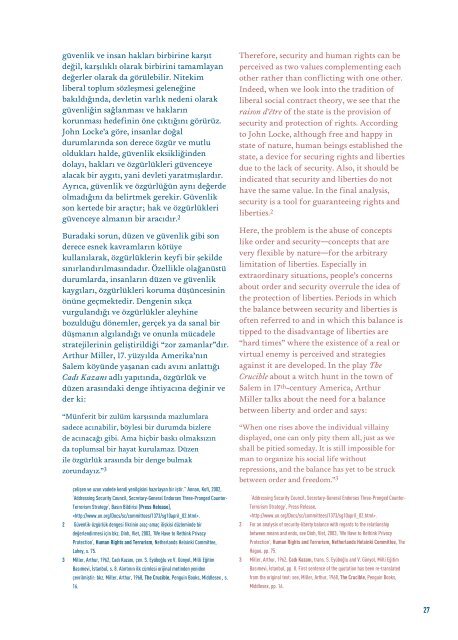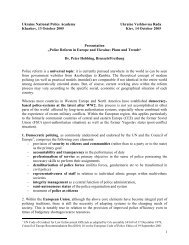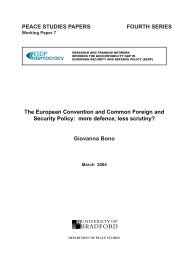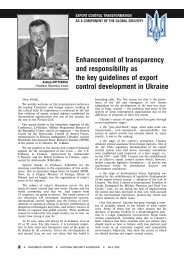Security Sector Governance: Turkey and Europe - DCAF
Security Sector Governance: Turkey and Europe - DCAF
Security Sector Governance: Turkey and Europe - DCAF
You also want an ePaper? Increase the reach of your titles
YUMPU automatically turns print PDFs into web optimized ePapers that Google loves.
güvenlik ve insan haklar› birbirine karfl›t<br />
de¤il, karfl›l›kl› olarak birbirini tamamlayan<br />
de¤erler olarak da görülebilir. Nitekim<br />
liberal toplum sözleflmesi gelene¤ine<br />
bak›ld›¤›nda, devletin varl›k nedeni olarak<br />
güvenli¤in sa¤lanmas› ve haklar›n<br />
korunmas› hedefinin öne ç›kt›¤›n› görürüz.<br />
John Locke’a göre, insanlar do¤al<br />
durumlar›nda son derece özgür ve mutlu<br />
olduklar› halde, güvenlik eksikli¤inden<br />
dolay›, haklar› ve özgürlükleri güvenceye<br />
alacak bir ayg›t›, yani devleti yaratm›fllard›r.<br />
Ayr›ca, güvenlik ve özgürlü¤ün ayn› de¤erde<br />
olmad›¤›n› da belirtmek gerekir. Güvenlik<br />
son kertede bir araçt›r; hak ve özgürlükleri<br />
güvenceye alman›n bir arac›d›r. 2<br />
Buradaki sorun, düzen ve güvenlik gibi son<br />
derece esnek kavramlar›n kötüye<br />
kullan›larak, özgürlüklerin keyfi bir flekilde<br />
s›n›rl<strong>and</strong>›r›lmas›ndad›r. Özellikle ola¤anüstü<br />
durumlarda, insanlar›n düzen ve güvenlik<br />
kayg›lar›, özgürlükleri koruma düflüncesinin<br />
önüne geçmektedir. Dengenin s›kça<br />
vurgul<strong>and</strong>›¤› ve özgürlükler aleyhine<br />
bozuldu¤u dönemler, gerçek ya da sanal bir<br />
düflman›n alg›l<strong>and</strong>›¤› ve onunla mücadele<br />
stratejilerinin gelifltirildi¤i “zor zamanlar”d›r.<br />
Arthur Miller, 17. yüzy›lda Amerika’n›n<br />
Salem köyünde yaflanan cad› av›n› anlatt›¤›<br />
Cad› Kazan› adl› yap›t›nda, özgürlük ve<br />
düzen aras›ndaki denge ihtiyac›na de¤inir ve<br />
der ki:<br />
“Münferit bir zulüm karfl›s›nda mazlumlara<br />
sadece ac›nabilir, böylesi bir durumda bizlere<br />
de ac›naca¤› gibi. Ama hiçbir bask› olmaks›z›n<br />
da toplumsal bir hayat kurulamaz. Düzen<br />
ile özgürlük aras›nda bir denge bulmak<br />
zorunday›z.” 3<br />
çeliflen ve uzun vadede kendi yenilgisini haz›rlayan bir ifltir.” Annan, Kofi, 2002,<br />
‘Addressing <strong>Security</strong> Council, Secretary-General Endorses Three-Pronged Counter-<br />
Terrorism Strategy’, Bas›n Bildirisi [Press Release],<br />
.<br />
2 Güvenlik-özgürlük dengesi fikrinin araç-amaç iliflkisi düzleminde bir<br />
de¤erlendirmesi için bkz. Dinh, Viet, 2003, ‘We Have to Rethink Privacy<br />
Protection’, Human Rights <strong>and</strong> Terrorism, Netherl<strong>and</strong>s Helsinki Committee,<br />
Lahey, s. 75.<br />
3 Miller, Arthur, 1962, Cad› Kazan›, çev. S. Eyübo¤lu ve V. Günyol, Milli E¤itim<br />
Bas›mevi, ‹stanbul, s. 8. Al›nt›n›n ilk cümlesi orijinal metinden yeniden<br />
çevrilmifltir: bkz. Miller, Arthur, 1968, The Crucible, Penguin Books, Middlesex , s.<br />
16.<br />
Therefore, security <strong>and</strong> human rights can be<br />
perceived as two values complementing each<br />
other rather than conflicting with one other.<br />
Indeed, when we look into the tradition of<br />
liberal social contract theory, we see that the<br />
raison d’être of the state is the provision of<br />
security <strong>and</strong> protection of rights. According<br />
to John Locke, although free <strong>and</strong> happy in<br />
state of nature, human beings established the<br />
state, a device for securing rights <strong>and</strong> liberties<br />
due to the lack of security. Also, it should be<br />
indicated that security <strong>and</strong> liberties do not<br />
have the same value. In the final analysis,<br />
security is a tool for guaranteeing rights <strong>and</strong><br />
liberties. 2<br />
Here, the problem is the abuse of concepts<br />
like order <strong>and</strong> security—concepts that are<br />
very flexible by nature—for the arbitrary<br />
limitation of liberties. Especially in<br />
extraordinary situations, people’s concerns<br />
about order <strong>and</strong> security overrule the idea of<br />
the protection of liberties. Periods in which<br />
the balance between security <strong>and</strong> liberties is<br />
often referred to <strong>and</strong> in which this balance is<br />
tipped to the disadvantage of liberties are<br />
“hard times” where the existence of a real or<br />
virtual enemy is perceived <strong>and</strong> strategies<br />
against it are developed. In the play The<br />
Crucible about a witch hunt in the town of<br />
Salem in 17 th-century America, Arthur<br />
Miller talks about the need for a balance<br />
between liberty <strong>and</strong> order <strong>and</strong> says:<br />
“When one rises above the individual villainy<br />
displayed, one can only pity them all, just as we<br />
shall be pitied someday. It is still impossible for<br />
man to organize his social life without<br />
repressions, <strong>and</strong> the balance has yet to be struck<br />
between order <strong>and</strong> freedom.” 3<br />
‘Addressing <strong>Security</strong> Council, Secretary-General Endorses Three-Pronged Counter-<br />
Terrorism Strategy’, Press Release,<br />
.<br />
2 For an analysis of security-liberty balance with regards to the relationship<br />
between means <strong>and</strong> ends, see Dinh, Viet, 2003, ‘We Have to Rethink Privacy<br />
Protection’, Human Rights <strong>and</strong> Terrorism, Netherl<strong>and</strong>s Helsinki Committee, The<br />
Hague, pp. 75.<br />
3 Miller, Arthur, 1962, Cad› Kazan›, trans. S. Eyübo¤lu <strong>and</strong> V. Günyol, Milli E¤itim<br />
Bas›mevi, ‹stanbul, pp. 8. First sentence of the quotation has been re-translated<br />
from the original text: see, Miller, Arthur, 1968, The Crucible, Penguin Books,<br />
Middlesex, pp. 16.<br />
27

















